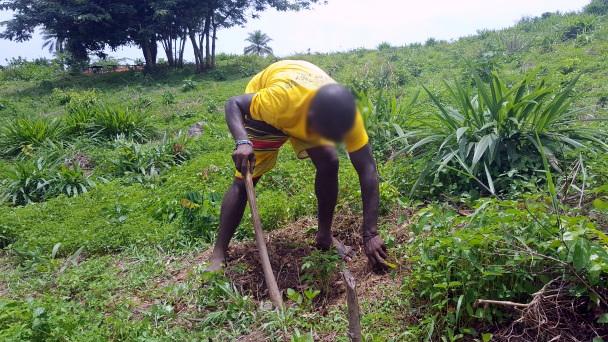Voinjama, 20 April 2017 – Farming is the key rehabilitation activity being undertaken at the Voinjama Central Prison (VCP). According to UNMIL’s Corrections Mentor, Mr. Yeboah Anane such programs aim at reducing recidivism by equipping prisoners with life-skills to render them more productive and self-reliant after serving their jail time.
Paul*, one of the inmates who was sentenced for rape said that he was very grateful for this opportunity to learn new skills which will enable him to take care of his family upon release from prison. Paul and other inmates weed a cassava farm at the VCP as the Supervising Superintendent encourages them to keep up the hard work.
Recalling resolution 69/172 of 18 December 2014, on ‘Human rights in the administration of justice’, the social rehabilitation and reintegration of persons deprived of their liberty is among the essential aims of the criminal justice system; ensuring that offenders are able to lead a law-abiding and self-supporting life upon their reintegration into society.
The VCP maximum capacity is 40 detainees at a time. For the time being it is overcrowded and it has 59 inmates out of which 33 are sentenced inmates and 26 pretrial detainees, all male adults.
Their access to rehabilitation activities is on a voluntary basis. It requires from inmates to sign-up for programs according to their specific preferences. “I prefer farming because my wife owns a farm and I will be able to assist her when I return home. I will stop all the wicked deeds I was engaged in and become a more responsible citizen” said Paul. “Farming also enables me to enjoy the outdoor breeze while manual labor helps in building up my muscles”, he said chuckling as he tilled the soil with his hoe.
UNMIL mentors and provides in-service training to VCP staff while also supporting the facility to mobilize financial resources for rehabilitation programs from non-governmental stakeholders, including civil society and the private sector. More funding has been secured for new projects which are in the pipeline, consisting of tailoring and soap manufacturing. All produces are eventually consumed by the inmates themselves.
In a nutshell, the Voinjama Central Prison rehabilitation projects are beneficial not only to prevent prisoners from re-offending but also to ensure public safety.
*Real name is known to the editors and it has been changed to Paul on the grounds to protect the subject’s identity.






